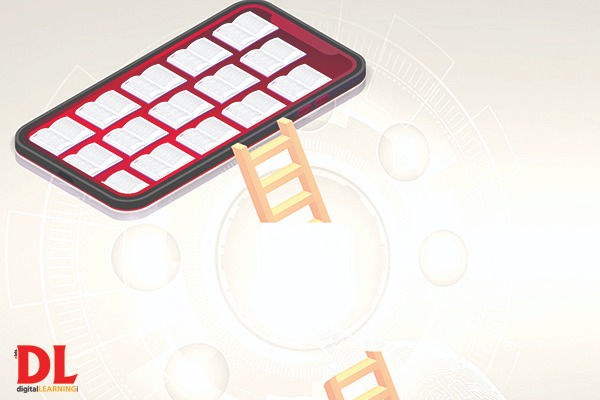
Education needs a new definition, a definition never explored before – it’s time to ‘Explore the Next in Education’. It’s time to circumvent the formidable challenges and reach the zenith in all ways possible to meet the evolving needs of learners in today’s fiercely competitive world.
What is Next in Education? With all the rigorous transformation, it is hard to stick to one. The education ecosystem is large and longing to transform at the fastest speed and the digital wave is making it even faster.
Education beyond classrooms, digital devices, edtechs, rise of subscription-based learning, AI-based learning and more are going to rule the next generation of education. It will be no longer necessary to visit an offline campus to be Data Scientist or to be an Architect, learning will be on the move in the forthcoming times. Recently, a UK graduate wrote an essay using the contentious AI chatbot and surprisingly received passing grades, according to ‘The Independent’. Another graduate from the University of Bristol decided to see if ever-hyped AI tools might be utilised to complete theory assignments and coursework. He used the bot to write a 2,000-word article about social policy. The bot completed an assignment that students were supposed to complete in 12 weeks in 20 minutes. The internet is buzzing with many such stories nowadays. It would not be hyperbolic to say that humans are hijacked by machines and the world will see more of it in the years to come.
Everyone has one’s own opinion on technology implementation. The education fraternity across the globe is continuously aligning itself with the the evolving technologies and believes ‘technology can never replace humans, though humans who don’t know how to use technology will be replaced’. Consider the automatic teller machine as a primary example. Developed in the 1960s and popularised in the 70s and 80s, it was expected that it will likely replace some human tellers, but it’s 2023 and most banks and organisations still have tellers. World is looking at technology as a promise, not as a peril. Alvin Toffler, an American writer once said, “The illiterate of 21st-century won’t be those who cannot read or write but those who cannot learn, unlearn and relearn”. It’s mandatory to match yourself with evolving technology to stay relevant in the 21st century.
It is the century of most novel innovations like Artificial Intelligence, Machine Learning, Big Data, Metaverse, Cloud, Internet of Things, and more. The stage is open now for innovations and that can’t happen in isolation, it’s time to expand our horizon and go global. It’s time for international collaboration for mutual recognition of countries. Most recently, Australian Education Minister Jason Clare signed an MoU with the Education Minister of India on a Mechanism for the Mutual Recognition of Qualifications. Australia will start recognising higher education degrees obtained in India under this mutual framework.
The forthcoming in the education sector are endless as the sector is growing at an unprecedented rate. Global Education and Training Expenditure is set to reportedly reach at least $10T by 2030 as technology drives unprecedented re-skilling and up-skilling in developed economies. The next of education is bigger and brighter.
Exploring the Next in Education: Technology Outlook
Technology has played an increasingly important role in education, from online classes to interactive learning platforms. With the advancement of technology, new opportunities are opening up to revolutionise the way we teach and learn.
Latest Trends
- Artificial Intelligence (AI): Artificial Intelligence (AI) is one of the most promising technologies in education. AI can help personalise learning by analyzing data on individual student performance, preferences, and learning styles. It can also help teachers and administrators identify patterns and trends in student data that can inform decisions about curriculum and instruction. AI-powered chatbots can also help students with questions and support them in real-time. Additionally, AI can help automate grading and assessment, freeing up teachers to focus on more personalized instruction and feedback.
- Virtual and Augmented Reality (VR/AR): Virtual and Augmented Reality (VR/AR) is another technology that has the potential to revolutionise education. With VR/ AR, students can experience immersive simulations that help them understand complex concepts and scenarios. For example, medical students can use VR/AR to practice surgeries in a realistic virtual environment, without the risk of harming real patients. Similarly, students studying history can use VR/AR to experience historical events and places, bringing history to life in a way that is not possible with traditional teaching methods.
- Subscription-Based Learning: Today, we have many platform that works on subscription like Upgrad, Unacademy, Coursera and more. You just have to select the right package & learn. All that is possible because we have technologies that can conduct live study sessions, remote proctoring and more which makes these platforms– a great success!
- Metaverse: Metaverse has the potential to transform education by providing a more engaging, flexible, and immersive learning environment. One of the main benefits of the metaverse is its ability to provide immersive and interactive learning experiences. Students can explore virtual environments, engage in simulations and experiments, and collaborate with other learners from anywhere in the world.
Moreover, the metaverse offers a level of flexibility and accessibility that traditional education cannot provide. For example, learners can access courses and resources at any time and from any location, making it possible for them to learn at their own pace. Additionally, the metaverse is making education more engaging and enjoyable.
- Gamification: Gamification involves using game-like elements, such as rewards, badges, and leaderboards, to motivate and engage students in earning. This technology can help students stay engaged and motivated while they learn, making education more fun and exciting.
- Gamification can also help teachers and administrators track student progress and identify areas where students may be struggling. It is particularly effective for teaching STEM subjects, where concepts can be abstract and difficult to grasp.
- Learning Management Systems (LMS): Learning Management Systems (LMS) are software applications that help teachers and administrators manage and deliver educational content. LMS can be used to create and deliver online courses, manage student progress and assessment, and track student performance. LMS can also help facilitate communication between teachers, students, and parents, making it easier to provide feedback and support. They can be used to provide access to a range of resources such as videos, online libraries, and interactive learning tools.
- Blockchain: Blockchain technology has the potential to transform the way we store and verify educational credentials. With blockchain, educational records can be stored in a secure and decentralized system that is accessible to students, employers, and educational institutions. This technology can help students maintain ownership of their credentials, making it easier for them to share their educational achievements with potential employers or educational institutions. It can also help prevent fraud and ensure the integrity of educational credentials.
This is not all! There is a vast scope to leverage tech-drievn innovations in the education sector. From personalised learning to immersive simulations, new-age technologies have the potential to create more engaging and effective learning experiences for students around the world. It will be exciting to see how they will continue to shape the future of education.
International Collaborations: A much needed next in education
Entire world is One – “Vasudhaiva Kutumbakam’- in short one world and one family. International collaborations are not just beneficial for one nation but a lot and the entire poplucae of the countries involved. Recently, The University of Virginia has inaugurated a new partnership with Jindal Global University (JGU) – to provide a significant new platform for student and scholar exchange, joint research on topics of global importance such as democracy and environmental sustainability, and a general expansion of UVA’s engagement in India. Also, Australian PM Anthony Albanese announced that they have finalised Australia-India Education Qualification Recognition Mechanism which means that if you are an Indian student who is studying or have studied in Australia, your hard-earned degree will be recognised when you return home. Or if you are a member of Australia’s very large Indian community — 500,000 and growing — you will feel more confident that your Indian qualification will be recognised in Australia. Now, the time has come when you no longer want to go abroad to study, world will be one and the opportunities will be open for all at their own home spaces.
Earlier, India also announced that we are open for foreign varisties to open campuses in India.
As a result, Australia’s Deakin University will be the first foreign tertiary education institution in the world to establish a campus in India as the Albanese government ramps up prospects in the rapidly developing sector.
Harshita Sharma, Founder & Director, Brainstorm International shared, “Education should be seen in the broader context of community, economy and development with global collaborations. Pedagogic research is an ongoing process to upskill and uplift educators globally to improve teaching learning experiences with collaboration in education. We can keep up with the rapidly evolving ecosystem and focus on keeping education relevant ,responsible and responsive by raising global leaders who thrive on innovation and creativity. With the adaptation and testing of new techniques that can supplement their areas of expertise, global collaboration helps teachers improve their practises and leaders to enhance their professional skills.”
Dr. Ankur Jain, Director, Vanasthali Public School shared, “International student collaboration at an early age helps to promote and revitalise local communities. It is a turning point for the student as it increases interaction between two universities and leads to the improvement in the quality of children.
Children get exposure and opportunities to group problems from multiple perspectives. It also promotes Science and technology development and helps to create global leaders the primary stage of collaboration provides evidence through advocacy and communication on enhancement.”
India – Dubai collaboration: A wave of education partnership
India’s extended neighborhood with the UAE has gained strategic importance due to its geostrategic location, availability of adequate energy resources, home to a significant number of Indians, as well as an important source of remittances to India, and growing prospects for social sectors such as education and health, shared Dr. Vishal Arora, Associate Director, International Admissions, JAIN (Deemed-to-beUniversity).
The UAE’s education market is currently expanding globally, characterised by rising student enrollments, a growing interest in education sector privatisation, and support for government efforts. The global education market size in UAE is estimated to increase by $718 million. The market’s growth momentum will progress at a CAGR of 5.03 per cent. Also, UAE Private K12 Education Market is poised to grow at a CAGR of 5 per cent by 2027.
With the vision to explore future-ready innovations and strengthen collaborative environment, Elets Technomedia is bringing top education leaders and experts from Asia and the Middle East for exchnage of ideas, and best practices at the 25th Elets World Education Summit (WES) on 20-21 March in Dubai.
A lot of our speakers have commented on international collaborations and how WES is helping in doing so. Here is a quick glance:
Nirmal Singh Founder & CEO, Wheebox
“I believe that conferences like such bring together the brightest minds in the field of education to unlock fresh strategies and foster new approaches to building a future-ready education ecosystem. This can lead to the development of policies and initiatives that can benefit students, teachers, and educational institutions globally. Our mission for 2024 is to study the impact of Artificial Intelligence on the Future of Education, Work and Mobility. The summit will give us the opportunity to explore innovative technologies, methodologies, and best practices that can help in transformation.” “I strongly believe that the World Education Summit 2023 can serve as a catalyst for change and inspire stakeholders to work towards creating a better future for education.”
Dr Madhuri Sawant Founder & MD, Barinqaurtz
“I commend the work that the organisers of the World Education Summit 2023 are doing. Conferences such as this facilitate these exchanges of ideas & best practices through both presentations (one-to-many) and networking (one-on-one).”
Today we are at the intersection of multiple global megatrends: ubiquitous connectivity, high-value use cases such as digital payments, remote work/remote education, misinformation, and climate change. The exchange of ideas and best practices, ideally in an in-person setting, helps educators, technologists, businesspeople, and policymakers from around the world drive higher standards in their respective spheres and as a result for the whole world. Globally, there is no uniformity in education systems, every country follows its own style of school education system. Such platforms and conferences could bring uniformity and best practices and ideas which could be adapted globally to standardise school education system.”
Gunjan Pandita Khashu CEO, Accuracy
“Such conferences can help bring together stakeholders from different backgrounds and regions to share knowledge, collaborate on solutions, and promote policies and practices that can improve education outcomes at a global level. Through this event, we look forward to having a unified platform to convey our message to our target audience.”
Harshita Sharma Founder & Director Brainstorm International
“Global summits like the World Education Summit give the experience of a lifetime and bring together innovation, best pedagogies, and new edge technology under one roof for transforming the education eco-system.
It opens doors to the idea of unlearning to re-learn and make a difference in the life of students globally. Decoding International education, connecting with all stakeholders and brainstorming on transforming teaching-learning processes to be well prepared to deal with the challenges of the 21st century to evolve and revamp in perfect tandem with changing times to innovate design thinking solutions. This will definitely bring new innovations and development to the landscape of education in India.”
Dr. Sheela Menon Principal, Ambassador School, Dubai
“Meeting people from the same industry but from different places of the world always is a route towards positive changes and growth. Knowing some of the best minds and learning and sharing from each other helps to find solutions to some of the raging concerns which are global phenomenon.





















